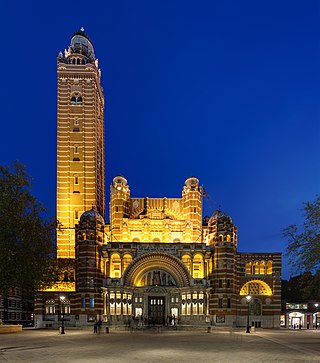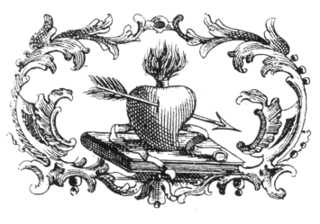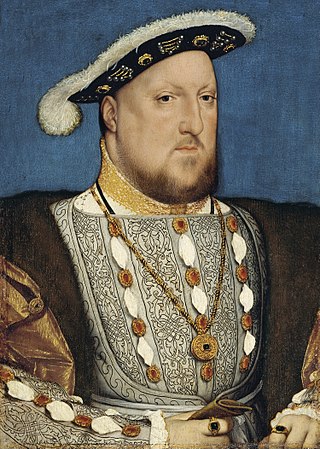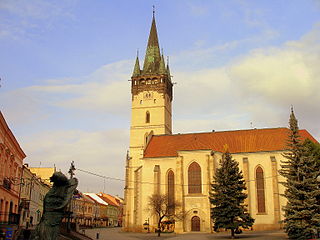Related Research Articles

The Order of Preachers abbreviated OP, also known as the Dominicans, is a Catholic mendicant order of pontifical right founded in France, by a Spanish priest, saint and mystic, Dominic. It was approved by Pope Honorius III via the papal bull Religiosam vitam on 22 December 1216. Members of the order, who are referred to as Dominicans, generally carry the letters OP after their names, standing for Ordinis Praedicatorum, meaning of the Order of Preachers. Membership in the order includes friars, nuns, active sisters, and lay or secular Dominicans. More recently there has been a growing number of associates of the religious sisters who are unrelated to the tertiaries.

The 16th century begins with the Julian year 1501 (MDI) and ends with either the Julian or the Gregorian year 1600 (MDC).

The 1500s ran from January 1, 1500, to December 31, 1599.
Timothy James Fox is an American priest and theologian. Formerly a member of the Dominican Order within the Catholic Church, he became a member of the Episcopal Church following his expulsion from the order in 1993.

The Tudor period occurred between 1485 and 1603 in England and Wales and includes the Elizabethan period during the reign of Elizabeth I until 1603. The Tudor period coincides with the dynasty of the House of Tudor in England that began with the reign of Henry VII. Historian John Guy (1988) argued that "England was economically healthier, more expansive, and more optimistic under the Tudors" than at any time since the Roman occupation.
Michael Baigent was a New Zealand writer who published a number of popular works questioning traditional perceptions of history and the life of Jesus. He is best known as a co-author of the book The Holy Blood and the Holy Grail.

Richard Peter McBrien was a Catholic priest, theologian, and writer, who was the Crowley-O'Brien Professor of Theology at the University of Notre Dame in South Bend, Indiana, U.S. He authored twenty-five books, including the very popular Catholicism, a reference text on the Church after the Second Vatican Council.

The Da Vinci Code is a 2003 mystery thriller novel by Dan Brown. It is Brown's second novel to include the character Robert Langdon: the first was his 2000 novel Angels & Demons. The Da Vinci Code follows symbologist Robert Langdon and cryptologist Sophie Neveu after a murder in the Louvre Museum in Paris causes them to become involved in a battle between the Priory of Sion and Opus Dei over the possibility of Jesus Christ and Mary Magdalene having had a child together.

The Catholic Church in the United Kingdom is part of the worldwide Catholic Church in communion with the Pope. While there is no ecclesiastical jurisdiction corresponding to the political union, this article refers to the Catholic Church's geographical representation in mainland Britain as well as Northern Ireland, ever since the establishment of the UK's predecessor Kingdom of Great Britain by the Union of the Crowns in 1707.

The Order of Saint Augustine, abbreviated OSA, is a religious mendicant order of the Catholic Church. It was founded in 1244 by bringing together several eremitical groups in the Tuscany region who were following the Rule of Saint Augustine, written by Saint Augustine of Hippo in the fifth century.
The Dominican House of Studies is a Catholic institution in Washington, DC, housing both the Priory of the Immaculate Conception, a community of the Province of St. Joseph of the Order of Preachers (Dominicans), and the Pontifical Faculty of the Immaculate Conception, an ecclesiastical faculty of theology.

The Stripping of the Altars: Traditional Religion in England, 1400–1580 is a work of history written by Eamon Duffy and published in 1992 by Yale University Press. It received the Longman-History Today Book of the Year Award.
Carl E. Olson is an American theologian, a Christian apologist and non-fiction author.

The history of the Catholic Church is the formation, events, and historical development of the Catholic Church through time.

The English Reformation took place in 16th-century England when the Church of England broke away from the authority of the pope and the Catholic Church. These events were part of the wider European Reformation, a religious and political movement that affected the practice of Christianity in Western and Central Europe.
John Hungerford Pollen was an English Jesuit, known as a historian of the Protestant Reformation.

In 16th-century Christianity, Protestantism came to the forefront and marked a significant change in the Christian world.
A Nicodemite is a person suspected of publicly misrepresenting their religious faith to conceal their true beliefs. The term is sometimes defined as referring to a Protestant Christian who lived in a Roman Catholic country and escaped persecution by concealing their Protestantism.

The reign of Elizabeth I of England, from 1558 to 1603, saw the start of the Puritan movement in England, its clash with the authorities of the Church of England, and its temporarily effective suppression as a political movement in the 1590s by judicial means. This of course led to the further alienation of Anglicans and Puritans from one another in the 17th century during the reign of King James (1603-1625) and the reign of King Charles I (1625-1649), that eventually brought about the English Civil War (1642-1651), the brief rule of the Puritan Lord Protector of England Oliver Cromwell (1653-1658), the English Commonwealth (1649-1660), and as a result the political, religious, and civil liberty that is celebrated today in all English speaking countries.
Father Michael Himes was a priest of the Roman Catholic Diocese of Brooklyn, New York. Himes was a theologian at Boston College in Chestnut Hill, Massachusetts. He served as professor and academic dean of the Seminary of Immaculate Conception on Long Island, New York, and as associate professor of theology at the University of Notre Dame.
References
- 1 2 "Providence College Theologian Uses Scholarship to Counter "The Da Vinci Code"". Providence College. 2006-05-12. Archived from the original on 2007-11-03. Retrieved 2008-05-13.
- 1 2 "Providence College Announces New, Full-Time Faculty". Providence College. 2005-10-31. Archived from the original on 2009-01-08. Retrieved 2008-05-13.
- 1 2 3 Vidmar, John (2005). English Catholic Historians and the English Reformation 1585-1954. Sussex Academic Press. Retrieved 2008-05-16.
- ↑ "Catholics in Britain and Ireland, 1558-1829: An article from: The Catholic Historical Review [HTML] (Digital)". Amazon. 2000. Retrieved 2008-05-13.[ dead link ]
- ↑ "The Catholic Historical Review". Project Muse. 2000. Retrieved 2008-05-13.